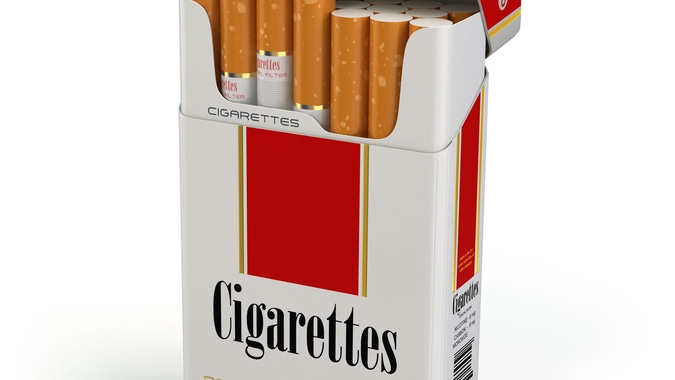Pandemic-led rise in demand for smoking products and growing health concerns have incentivized tobacco companies to invent low-risk tobacco products, which should drive the industry’s growth. Moreover, being a part of the consumer defensive industry, tobacco manufacturers Altria Group (MO) and Philip Morris (PM) should witness significant investors’ attention amid the economic uncertainties. But which of these stocks is a better buy now? Read more to find out.

shutterstock.com – StockNews
Altria Group, Inc. (MO) and Philip Morris International Inc. (PM) are prominent tobacco industry players. MO manufactures smokable products and oral tobacco products. MO is the parent company of Philip Morris USA (producer of Marlboro cigarettes).
PM manufactures and sells cigarettes, other nicotine-containing products, smoke-free products like heated tobacco and nicotine-containing vapor products, and related electronic devices and accessories.
The pandemic-led monotonous lifestyle and stress have increased the number of smokers and drove tobacco sales. However, strict FDA regulations and efforts to reduce nicotine content in products owing to growing health concerns have incentivized companies to develop low-risk novel products like moist snuff, e-vapors, e-cigars, and flavored tobacco products to meet the rising demand.
Moreover, being consumer defensive, the tobacco industry is well-positioned to stay afloat despite rising input costs. Furthermore, the U.S. tobacco market is expected to grow at a 3.4% CAGR to reach $102.70 billion by 2030. Therefore, high dividend-yielding MO and PM should grab significant investor attention amid the current uncertainties surrounding the stock market and the economy.
PM is a winner with 1.9% gains over the past week versus MO’s 0.7% returns. But which of these stocks is a better pick now? Let’s find out.
Latest Developments
On April 5, 2022, MO signed a virtual power purchase agreement (VPPA) for energy produced at Inertia Wind Energy Center in Haskell and Throckmorton Counties, Texas, to address the emissions from 100% of MO’s annual purchased electricity demand across all U.S. facilities.
This marks significant progress toward MO’s science-based environmental targets, achieving 100% renewable electricity and reducing operational greenhouse gas emissions by 55% by 2030.
On May 9, 2022, PM updated its ongoing discussions regarding a possible public takeover offer for Swedish multinational tobacco company Swedish Match AB (SWMAY). If approved, the acquisition will help PM gain access to SWMAY’s market-leading brands in the Smokefree, Cigars, and Lights product segments and expand its reach.
Recent Financial Results
MO’s net revenues for its fiscal 2022 first quarter ended March 31, 2022, decreased 2.4% year-over-year to $5.89 billion. However, the company’s gross profit came in at $3.37 billion for the quarter, up 3.1% from the prior-year period.
Its operating income came in at $2.88 billion, representing a 7.2% rise from the prior-year period. While its adjusted net income increased 3.2% year-over-year to $2.05 billion, its adjusted EPS increased 4.7% to $1.12. As of March 31, 2022, the company had $5.35 billion in cash and cash equivalents.
MO will pay a $0.90 per share quarterly cash dividend on July 11, 2022. The stock pays a $3.60 per share dividend annually, delivering a 7.95% annual yield. The company’s dividend has grown at an 8.09% rate over the past five years.
For the fiscal 2022 first quarter ended March 31, 2022, PM’s pro forma adjusted net revenues increased 3.5% year-over-year to $7.27 billion. The company’s gross profit came in at $5.14 billion, representing a 2.1% rise from the prior-year period. Its pro forma adjusted operating income came in at $3.16 billion for the quarter, decreasing 3.3% from the prior-year period.
PM’s net earnings came in at $2.33 billion, up 3.6% from the year-ago period. Its adjusted EPS came in at $1.56, indicating a marginal year-over-year decline. As of March 31, 2022, the company had $4.62 billion in cash and cash equivalents.
PM will pay a $1.25 quarterly cash dividend on July 15, 2022. The stock pays a $5 per share dividend annually, translating to a 5.10% yield. The company’s dividend has grown at a 3.64% rate over the past five years.
Past and Expected Financial Performance
Over the past three years, MO’s revenue and EBITDA have increased at 2.9% and 7.1% CAGRs, respectively.
MO’s EPS is expected to increase 5.2% year-over-year in fiscal 2022, ending December 31, 2022, and 5.4% in fiscal 2023. Its revenue is expected to decline marginally in fiscal 2022 and rise 1.5% in fiscal 2023. The company’s EPS is expected to grow at a rate of 5.5% per annum over the next five years.
Over the past three years, PM’s revenue and EBITDA have grown at 2.3% and 5.3% CAGRs, respectively.
Analysts expect PM’s EPS to decrease 9.2% year-over-year in fiscal 2022, ending December 31, 2022, and rise 9.6% in fiscal 2023. Its revenue is expected to decline 6.9% year-over-year in fiscal 2022 and rise 5.1% in fiscal 2023. PM’s EPS is expected to grow at a 3% rate per annum over the next five years.
Valuation
In terms of non-GAAP forward PEG, PM is currently trading at 2.06x, 19.1% higher than MO’s 1.73x. In terms of forward EV/Sales, MO’s 4.98x compares with PM’s 6.10x.
Profitability
PM’s trailing-12-month revenue is 1.5 times that of MO’s. However, MO is more profitable, with a 58.8% EBITDA margin versus PM’s 44.2%.
Furthermore, MO’s levered free cash flow margin of 36.5% compare with PM’s 31.6%.
POWR Ratings
While MO has an overall A grade, which translates to Strong Buy in our proprietary POWR Ratings system, PM has an overall C grade, equating to Neutral. The POWR Ratings are calculated by considering 118 distinct factors, each weighted to an optimal degree.
Both MO and PM have been graded an A for Quality, consistent with their higher-than-industry profitability ratios. MO’s 36.5% trailing-12-month levered free cash flow margin is 876.1% higher than the 3.7% industry average. PM has a 31.6% trailing-12-month levered free cash flow margin, 743.8% higher than the 3.7% industry average.
MO has been graded a C in terms of Sentiment, which is in sync with its slightly weak earnings growth expectation. MO’s EPS is expected to decline 0.5% year-over-year to $21 billion for fiscal 2022 ending December 31, 2022. PM’s D grade for Sentiment reflects its weak revenue estimated by analysts. The consensus revenue estimate of $29.22 billion for PM’s fiscal 2022 ending December 31, 2022, represents a 6.9% decline from the prior-year period.
Of the 10 stocks in the A-rated Tobacco industry, MO is ranked #3, while PM is ranked #5.
Beyond what we have stated above, our POWR Ratings system has graded MO and PM for Growth, Momentum, Stability, and Value. Get all MO ratings here. Also, click here to see the additional POWR Ratings for PM.
The Winner
High dividend yield and inelastic demand for products should help MO and PM attract significant investor attention in the upcoming months. However, relatively lower valuation and higher profitability make MO a better buy here.
Our research shows that the odds of success increase if one invests in stocks with an Overall POWR Rating of Buy or Strong Buy. Click here to access the top-rated stocks in the Tobacco industry.
MO shares fell $0.30 (-0.66%) in premarket trading Wednesday. Year-to-date, MO has declined 0.00%, versus a -20.79% rise in the benchmark S&P 500 index during the same period.
About the Author: Sweta Vijayan

Sweta is an investment analyst and journalist with a special interest in finding market inefficiencies. She’s passionate about educating investors, so that they may find success in the stock market.
The post Better Buy: Altria Group vs. Philip Morris International appeared first on StockNews.com